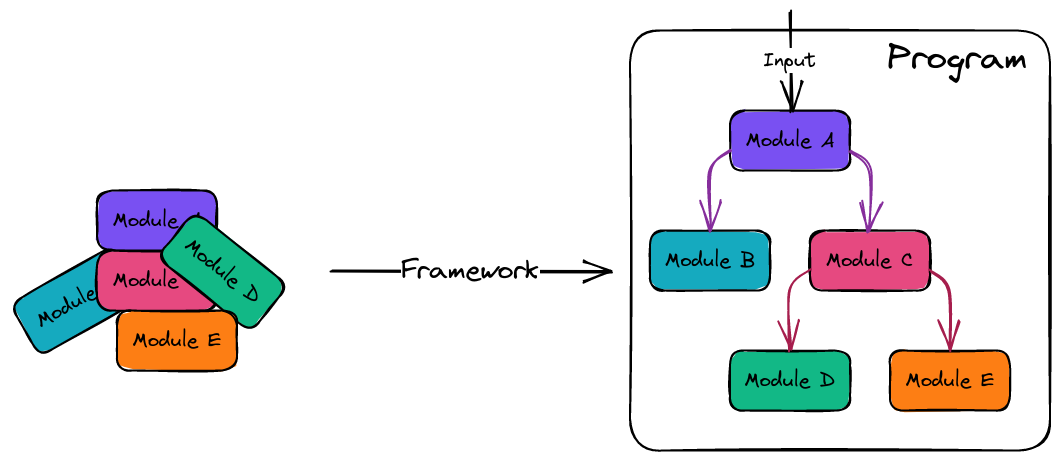PluginPlay Statement of Need
As summarized in Developing Scientific Software there is a need to transition to more modular scientific software. For our purposes a modular piece of code:
is created, maintained, and distributed independently of other modules.
fully encapsulates its dependencies.
has well-defined, stable APIs, both internally and externally.
is reusable by other packages as is.
Unfortunately, simply having a heap of modules does not equate to having research capable software. This is because you still need to “wire” the modules together to form a program. Fig. 2 illustrate this point pictorially.

Fig. 2 Modules by themselves do not form a program. A program results when the modules have been wired together.
Generally speaking, to go from a set of modules to a program there are two options: write a driver/workflow to call the modules, or load the modules into a framework and have the framework assemble the program. In the driver/ workflow option the set of modules is typically fixed and the calls are hard-coded. In turn adding more modules, or changing which module calls which, requires modifying the driver/workflow. A framework contains a template for the program and dynamically fills in the details from the available modules. A good framework also makes it easy to add more modules or change which modules call which modules.
With the points from What Sets Scientific Software Apart? in mind we argue that to successfully leverage scientific modules we need a framework capable of:
Performance
Scientific algorithms are computationally expensive.
Framework needs to avoid inhibiting module performance.
If the framework is performant, performance concerns fall to the module implementations.
Suggests that the bulk of the framework should be in C++
Modular/Component-Based Architecture
Program’s call graph assembled by wiring modules together.
Facilitates refactoring on a module basis, and in turn makes it easier to: retire modules, add new modules, and rewire the call graph.
Refactoring can be used as a means of rapid prototyping.
Encapsulation avoids leaking complicated details or large amounts of technical debt (the latter may occur as a result of rapid prototyping or different software development capabilities).
Encapsulation isolates developers from what everyone else is doing.
Python API facilitates manipulating the modules
Dynamic Module Interfaces
What we want to compute changes as research evolves.
Interfacing to software from new disciplines often requires new interfaces
Python is the de facto glue language of choice.
The need for the core framework to be written in C++, and the desire to support Python bindings, are fundamental design choices affecting all of PluginPlay. For this reason we do not continue to explicitly propagate them through the design documentation. However, when their assumption raises explicit concerns we will remind the reader of the language choices.